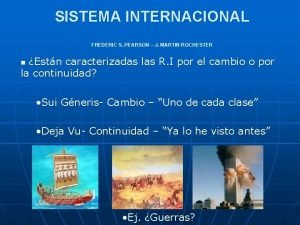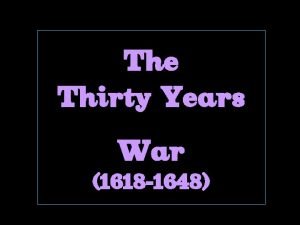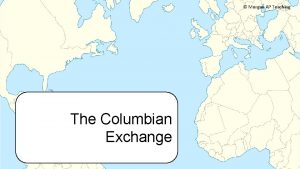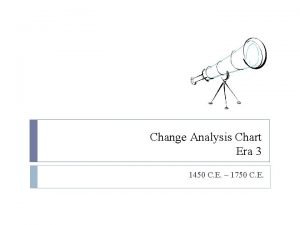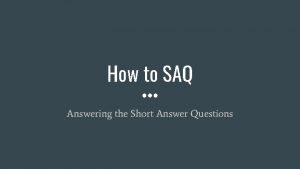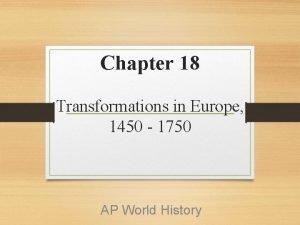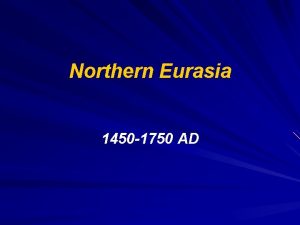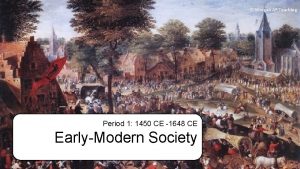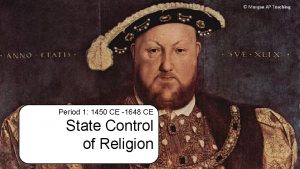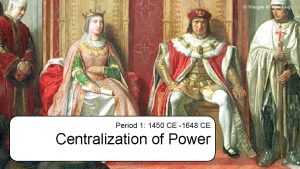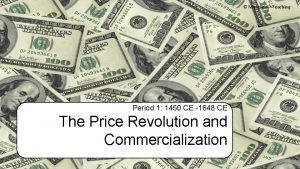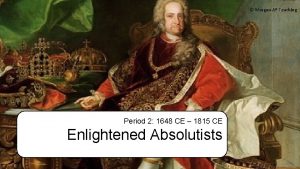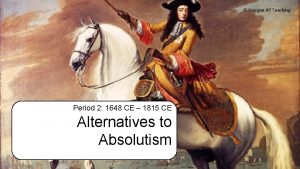Morgan AP Teaching Period 1 1450 CE 1648








- Slides: 8

© Morgan AP Teaching Period 1: 1450 CE -1648 CE The Age of Exploration

© Morgan AP Teaching Spain and Portugal Begin • Searching for a route to join the lucrative Indian Ocean Trade Network, Europeans stumbled up the Americas in the late 1400 s • While the Spanish and Portuguese were the first to initiate large-scale exploration, all Europeans were inspired to explore by the three Gs • The Portuguese focused more on setting up trade posts in Africa and South/East Asia • The Spanish focused more on conquering the Americas, Caribbean, & Pacific by forming colonies • Spain and its vast silver mining would make it the most powerful European state up until the end of the Thirty Years War


© Morgan AP Teaching Travel Technology • Lateen sails, stern-post rudder, and the caravel • Understanding of wind patterns (trade winds and Westerlies) • Compass, astrolabe, and portolan maps for navigation • Royal patronage and joint-stock investment funded • Guns and cannons allowed for easy conquest

© Morgan AP Teaching Columbian Exchange • To the New World: cattle, horses, pigs, smallpox, measles, rice, wheat • To the Old World: tomatoes, potatoes, corn, tobacco, turkey, syphilis • Impact on Old World: • Massive population growth due to calorie-dense foods • Vast amounts of wealth due to increased trade with foreign nations • The Atlantic States now had the economic power—not the Italian city-states • Impact on New World: • Massive population loss due to the spreading of Old World disease • Oppression due to plantations, mines, and slavery • Forced conversion to Christianity

© Morgan AP Teaching England, France, and the Netherlands • Entering the exploration scene late, the other Atlantic states attempted to grab themselves some lucrative colonies as well • All three started colonies in North America, the Caribbean, the Dutch • established a colony in Indonesia, and the French and British in India • These five dominated world trade for the next two centuries, fighting in Europe, and competing for colonies and resources throughout the world • In fact, the Dutch and English particularly developed a whole new set of economic tactics with which to compete with other Europeans: mercantilism • The goal of mercantilism being to increase exports, decrease imports, as well as disrupt the trade of other competing countries with privateering and pirating

© Morgan AP Teaching Treatment of Natives • One of the primary motivations for the Catholic explorers was missionary work: to convert, in some cases by force, Native Americans to Catholicism • While some missionaries were kind, and converting people with their kind treatment, help, and attitudes, many were quite violent • Natives working for colonial rulers were often required to practice Christianity, and forced to hide their beliefs through syncretism • Additionally, most Spanish and Portuguese rulers viewed the Natives as barbaric and inferior, and required civilizing and enlightenment from Christianity • Some Europeans, however, opposed Native treatment and the encomiendas System, such as Bartolome de las Casas, arguing such treatment is un-Christian

© Morgan AP Teaching Consequences • Exploration not only harmed Native Americans forced to work under the encomienda system on mines and plantations (haciendas), but Africans as well • In need of cheap and/or free labor, the Atlantic Slave Trade began, in which Europeans bought or captured West Africans for work • African slaves were forced to endure the grueling Middle Passage Trip from Africa as a part of the Triangular Trade System • Under this system, goods from the New World came to Europe, Were either sold or used for light manufactured production • The profits or goods were then sold to West Africa and Asia allowing more slaves to be purchased for the haciendas

